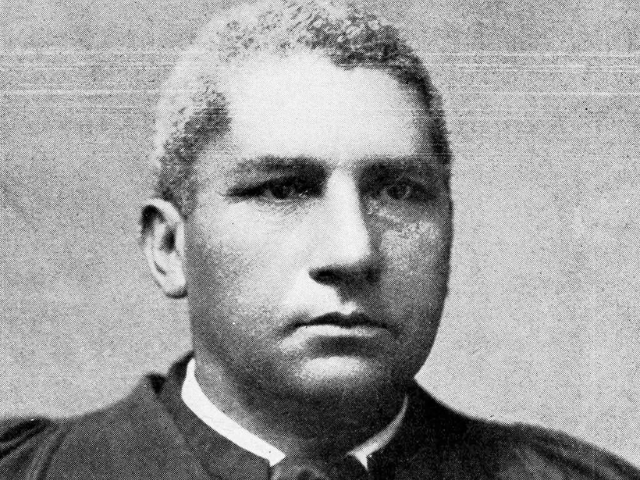
Henry McNeal Turner. Image from BlackPast.
(1834-1919) Turner was born in Newberry, South Carolina to free black parents Sarah Greer and Hardy Turner. By the age of fifteen, he worked as a janitor at a law firm in Abbeville, South Carolina. The firm’s lawyers noted his abilities and helped with his education. However, Turner was attracted to the church and after being converted during a Methodist religious revival, decided to become a minister. He joined the African Methodist Episcopal (AME) Church and became a licensed minister at the age of 19. Turner soon became an itinerant evangelist traveling as far as New Orleans, Louisiana. He married Eliza Peacher, the daughter of a wealthy African American house builder in Columbia, South Carolina. The couple had fourteen children but only four of them survived into adulthood.
In 1858 Turner entered Trinity College in Baltimore, Maryland where he studied Latin, Greek, Hebrew and theology. Turner cultivated friendships with important Republican Congressional figures. Turner had already become a national figure when in 1863 at the age of 29 he was appointed by President Lincoln to the position of Chaplain in the Union Army. Turner was attached to 1st Regiment, U.S. Colored Troops, making him the first African American chaplain in the history of the United States Army.
After the Civil War, Turner returned to Georgia and quickly became active in Reconstruction-era politics. In 1867 he organized for the Republican Party in Georgia and the following year was elected a delegate to the Georgia State Constitutional Convention. In the same year he was also elected to the Georgia State Legislature. Although 27 African Americans were elected to that body, a coalition of white Democrats and Republicans declared the African American members disqualified and refused to seat them.
President Ulysses S. Grant appointed Turner postmaster of Macon, Georgia. He was forced to resign in a few weeks under pressure from local Democrats. Turner moved to Savannah, Georgia where he served as pastor of St. Phillips AME Church. In 1876 he was appointed President of Morris Brown College in Atlanta. Four years later he was appointed a Bishop in the African Methodist Episcopal Church.
Turner became the first AME Bishop to ordain a woman, Sarah Ann Hughes, to the office of deacon. He also wrote The Genius and Theory of Methodist Polity in 1885 as a guide to the policies and practices of the AME Church.
By the late 1870s Turner became increasingly disillusioned with the inability of African Americans to achieve social justice in the United States. He proposed emigration back to Africa, an idea much discussed in the antebellum period but which all but disappeared during the Civil War and Reconstruction. By 1880 Turner had become one of the leading advocates of emigration, particularly to Liberia. He founded two newspapers to promote emigration. Between 1895 and 1896, Turner organized two ship voyages to Liberia which carried over 500 emigrants to Liberia. Many of them returned disillusioned and thus undermined Turner’s emigrationist work.
Turner also promoted the AME Church abroad. Between 1891 and 1898 he traveled to Africa four times to promote the church in West and South Africa.
Although he never completely relinquished his emigrationist ideas and remained in touch with numerous African leaders, Turner increasingly devoted the remainder of his life to church work. He died in Ontario, Canada while traveling on AME Church business.


